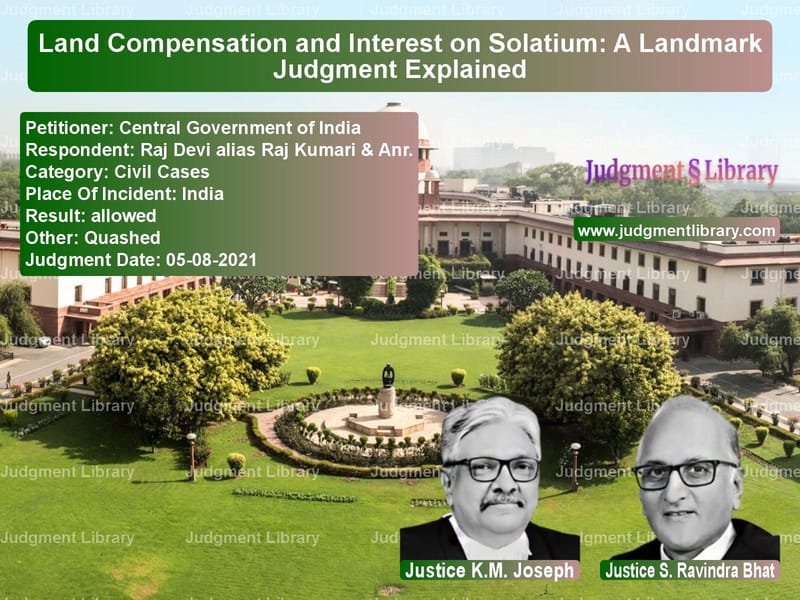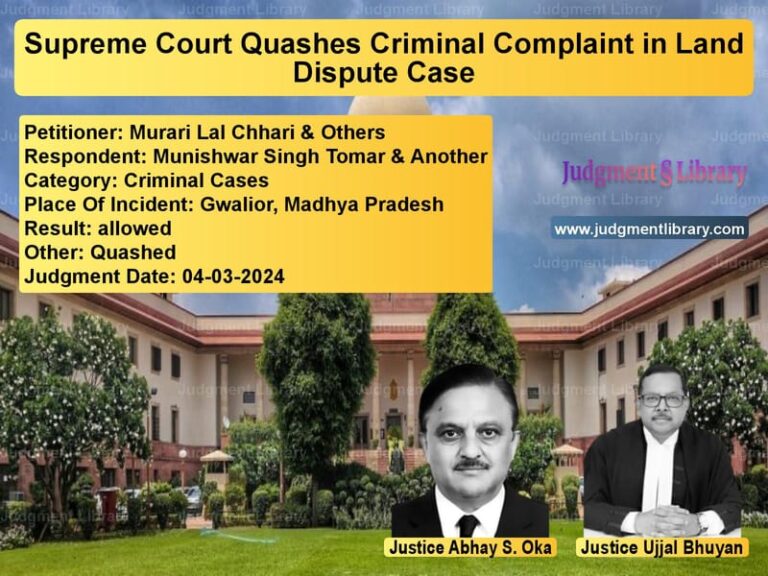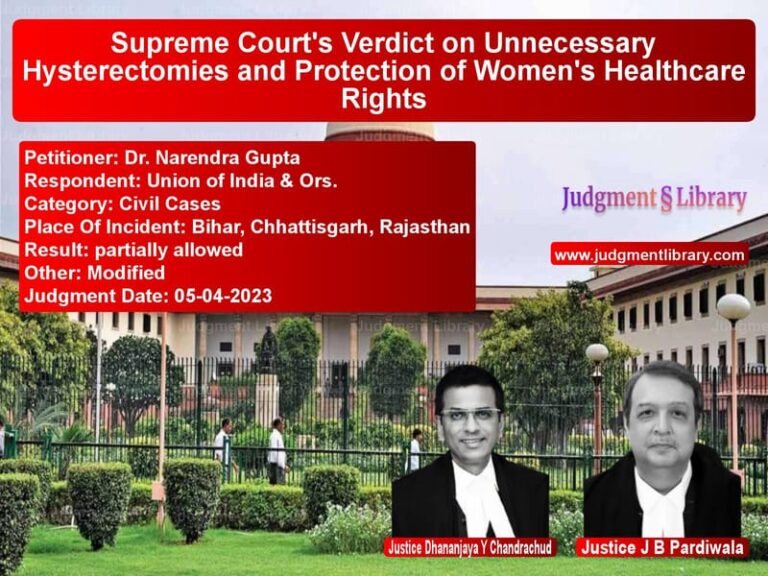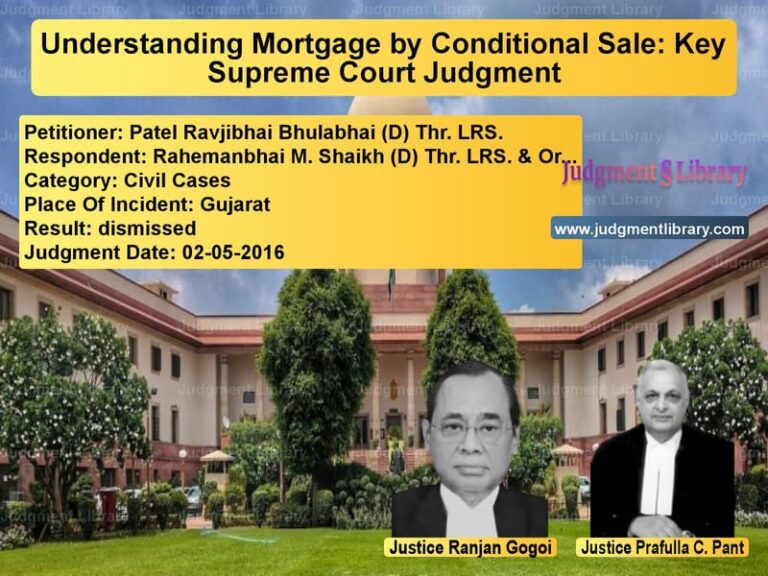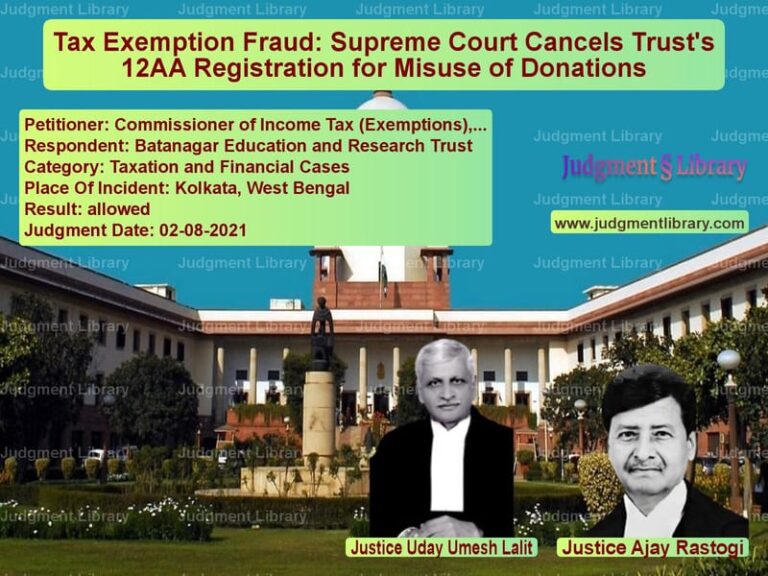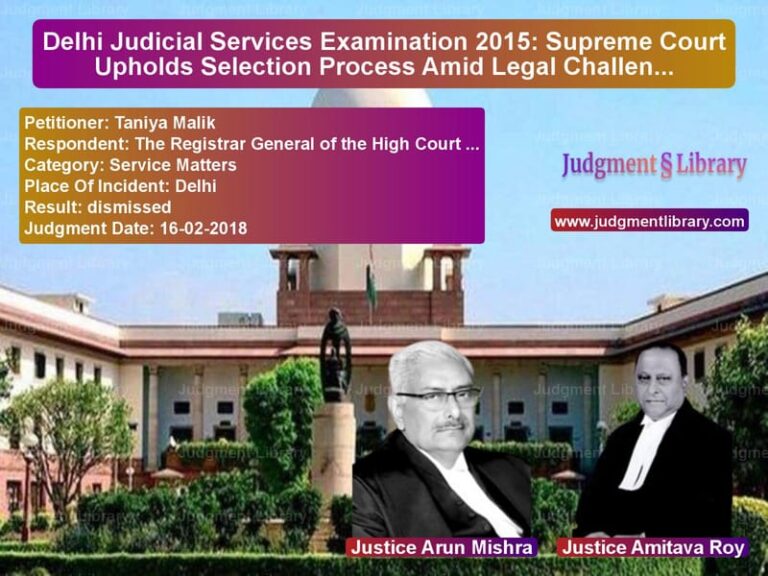Land Compensation and Interest on Solatium: A Landmark Judgment Explained
The case of Central Government of India vs. Raj Devi alias Raj Kumari & Anr. revolves around the issue of whether interest on solatium should be granted from the date of taking possession or from the date of the judgment in Sunder v. Union of India. The Supreme Court’s decision in this case clarifies the applicability of interest on solatium in land acquisition matters, settling an important legal question.
The dispute stemmed from the government’s acquisition of land, where the first respondent (Raj Devi) was deprived of her property. The legal contention primarily focused on when the interest on solatium should be applicable. The judgment considers previous landmark rulings and their implications on land acquisition compensation.
Background of the Case
The dispute in question was whether interest on solatium should be paid from the date of possession or from the date of the judgment in Sunder v. Union of India. The High Court upheld the order directing the government to make the payment, which led to the government’s appeal before the Supreme Court.
Key facts include:
- The physical possession of the land was taken on June 16, 1990.
- The Award for compensation was passed on June 12, 1990.
- The High Court had enhanced the compensation and granted statutory benefits, including solatium and interest.
- The Execution Court directed the government to pay interest on solatium from the date of taking possession.
Petitioner’s Arguments
The Central Government, represented by Additional Solicitor General Ms. Aishwarya Bhati, argued that:
- Interest on solatium could only be granted from the date of the Supreme Court’s judgment in Sunder v. Union of India (September 19, 2001).
- The principle laid down in Gurpreet Singh v. Union of India (2006) applied to this case, which held that interest on solatium should only be payable from the date of the judgment in Sunder.
- The Execution Court’s order was contrary to established legal precedents, as it directed interest to be paid from the date of possession.
Respondent’s Arguments
The respondent, represented by counsel J.S. Thind, contended that:
- The award of solatium and interest had already been upheld by the Supreme Court in related proceedings.
- Since the High Court had upheld the Execution Court’s order, the government had no valid reason to challenge the ruling.
- The claimant was deprived of possession in 1990, and thus, interest should be paid from that date.
Key Legal Considerations
The Supreme Court examined two key judgments:
- Sunder v. Union of India: This case established that interest is payable on solatium. However, it did not explicitly state from what date such interest should apply.
- Gurpreet Singh v. Union of India: This case clarified that interest on solatium can only be granted from the date of the Sunder judgment (September 19, 2001), not before.
Court’s Observations
The Supreme Court analyzed whether the Execution Court had overstepped its jurisdiction by ordering interest from the date of possession. The Court stated:
“It is well settled that an execution court cannot go behind the decree. If, therefore, the claim for interest on solatium had been made and the same has been negatived either expressly or by necessary implication by the judgment or decree of the Reference Court or of the appellate court, the execution court will have necessarily to reject the claim for interest on solatium based on Sunder on the ground that the execution court cannot go behind the decree.”
The Court further clarified:
“Interest on solatium can be claimed only in pending executions and not in closed executions, and the execution court will be entitled to permit its recovery from the date of the judgment in Sunder (19-9-2001) and not for any prior period.”
Final Verdict
The Supreme Court ruled in favor of the Central Government, setting aside the High Court’s order. The judgment stated:
“The appeal is allowed. The impugned order will stand set aside. The order which was impugned before the High Court will stand set aside and it is ordered that the 1st respondent will be entitled to interest on solatium from the date of Sunder (supra) viz. 19-9-2001.”
The ruling reaffirmed that interest on solatium cannot be applied retrospectively beyond the date of the Sunder judgment.
Implications of the Judgment
This judgment has far-reaching implications in land acquisition cases. Key takeaways include:
- Execution Courts must adhere to the terms of the decree and cannot extend interest benefits beyond what is specified in the judgment.
- Landowners are entitled to interest on solatium, but only from the date of the Sunder ruling.
- Government authorities can rely on this judgment to challenge retrospective claims for interest.
In conclusion, the Supreme Court’s ruling provides much-needed clarity on the issue of solatium interest, ensuring consistency in the application of land acquisition laws.
Petitioner Name: Central Government of India.Respondent Name: Raj Devi alias Raj Kumari & Anr..Judgment By: Justice K.M. Joseph, Justice S. Ravindra Bhat.Place Of Incident: India.Judgment Date: 05-08-2021.
Don’t miss out on the full details! Download the complete judgment in PDF format below and gain valuable insights instantly!
Download Judgment: central-government-o-vs-raj-devi-alias-raj-k-supreme-court-of-india-judgment-dated-05-08-2021.pdf
Directly Download Judgment: Directly download this Judgment
See all petitions in Property Disputes
See all petitions in Damages and Compensation
See all petitions in Landlord-Tenant Disputes
See all petitions in Specific Performance
See all petitions in Contract Disputes
See all petitions in Judgment by K.M. Joseph
See all petitions in Judgment by S Ravindra Bhat
See all petitions in allowed
See all petitions in Quashed
See all petitions in supreme court of India judgments August 2021
See all petitions in 2021 judgments
See all posts in Civil Cases Category
See all allowed petitions in Civil Cases Category
See all Dismissed petitions in Civil Cases Category
See all partially allowed petitions in Civil Cases Category

